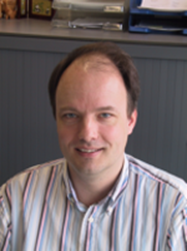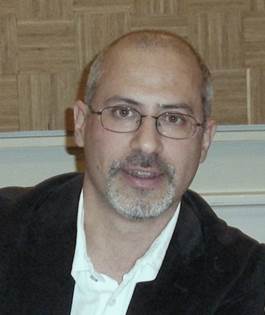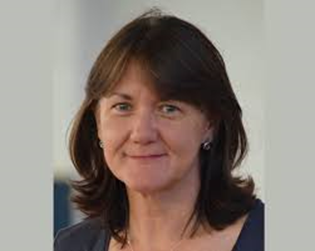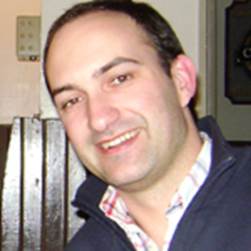
Jurriaan Huskens was born 1968 in Sittard, The Netherlands. He studied chemical engineering (with honors) at the Eindhoven University of Technology, The Netherlands. His final project, supervised by Prof. Dr. Constant A. A. van Boeckel and Dr. Will H. A. Kuijpers, involved the synthesis of well-defined phosphate-methylated oligonucleotides. He was a recipient of the Unilever Research Award 1990.
He obtained his PhD with Prof. Dr. Herman van Bekkum and Dr. Joop A. Peters from the Delft University of Technology, The Netherlands, in 1994. The PhD project, in the field of homogeneous catalysis and coordination chemistry of lanthanide complexes, encompassed the catalysis of Michael-type addition reactions, hydrolysis reactions of polyphosphates, and enantioselective Meerwein-Ponndorf-Verley reductions. As a part of this research, calorimetric measurements were performed at Florida State University, USA, in the group of Prof. Dr. Gregory R. Choppin.
In 1995 and 1996, he was a postdoc with Prof. Dr. A. Dean Sherry at the University of Texas at Dallas, USA. This project concerned the synthesis, characterization, and application of macrocyclic ligands for the development of medical diagnostics for magnesium and the characterization of novel lanthanide complexes for magnetic resonance imaging.
In 1997, he was awarded a Marie Curie fellowship from the European Commission to work in the group of Prof. Dr. Manfred T. Reetz at the Max-Planck-Institut für Kohlenforschung, Mülheim an der Ruhr, Germany. This project involved the fundamental aspects of enantiotopic group recognition, i.e. the selective complexation of one of two enantiotopic groups present in a single guest molecule by a chiral host.
In May 1998, he became Assistant Professor in the group of Prof. Dr. David N. Reinhoudt at the University of Twente, The Netherlands, and Associate Professor in March 2003. In this period he worked on aqueous supramolecular chemistry in solution and at surfaces and on surface structuring techniques. He is the recipient of an NWO “Vernieuwingsimpuls Vidi” grant (2002). From January 2005 – January 2008, he has been Program Director “Nanofabrication” at the MESA+ Institute for Nanotechnology, leading a joint research program between six research groups ranging from chemistry to physics to microengineering.
He has been appointed Full Professor “Molecular Nanofabrication” at the University of Twente, The Netherlands, in September 2005. He is the recipient of the Gold Medal of the Royal Netherlands Chemical Society 2007 and of the “Vernieuwingsimpuls Vici” grant (2008).
Present research interests encompass: supramolecular chemistry at interfaces, supramolecular materials, multivalency, nanofabrication, and solar fuels. He is (co)author of about 270 refereed research papers and three patents.

Javier Rojo obtiene la licenciatura en Ciencias Químicas en 1989 por la Universidad Autónoma de Madrid (UAM) en la que también obtuvo el grado de Doctor en Ciencias Químicas en 1995 bajo la dirección del Profesor Juan Carlos Carretero. Posteriormente, realizó dos estancias postdoctorales, la primera en el laboratorio del Profesor Jean-Marie Lehn en Estrasburgo (1995-1998) y la segunda bajo la dirección del Profesor Larry McLaughlin en el Boston College en Estados Unidos (1998-1999). En enero del año 2000 se incorpora al Grupo de Carbohidratos del Instituto de Investigaciones Químicas del CSIC en Sevilla con un contrato de reincorporación de doctores del MEC. En el año 2001 consigue un contrato Ramón y Cajal y en el 2004 obtiene la plaza de Científico Titular del CSIC. En el año 2011 promociona a Investigador Científico.
Los temas de interés se enmarcan en el desarrollo de estructuras glicodendríticas y el estudio de sus aplicaciones biológicas. En concreto, la investigación se centra en el diseño, síntesis y caracterización de sistemas multivalentes basados en dendrímeros y dendrones convenientemente funcionalizados para poder conjugar carbohidratos y otras moléculas de interés biológico como péptidos, ácidos nucleicos, etc. Estos sistemas están diseñados fundamentalmente para el estudio de la interacción con la lectina DC-SIGN presente en la superficie de las células dendríticas. El objetivo es fundamentalmente el desarrollo de sistemas antivirales y de moduladores de la respuesta inmune mediada por la interacción con dicha lectina.

María Isabel Montañez Vega obtained her Chemistry degree (2000) and PhD (2007) at the University of Málaga (UMA). Her PhD studies were carried out in the Organic Chemistry Department, under supervision of Prof. Suau and Prof. Perez-Inestrosa, with thesis entitled: “Synthesis and Study of Antigenic Determinants of Cephalosporins and Dendrimeric Antigens of Penicillins, for Detection of IgE Specific to Betalactams”. These studies were done in collaboration with the Hospital Research Group of Allergic Diseases, in which these new materials were clinically evaluated. She also joined the group of Prof. Tomalia at Central Michigan University (Michigan, US) for 3 months (2003), to learn about dendrimer structural characterization. As a result of these joint studies (organic synthesis, macromolecules binding and their immunological recognition), structure/immunological recognition relationships could be established. In 2008 she joined the group of Prof. Hult and Prof. Malkoch, the Division of Coating Technology, at Royal Institute of Technology (Stockholm, Sweden) for a postdoctoral stay of 2 years, and worked in projects related with highly efficient and versatile design of complex macromolecules via click chemistry for advanced biomedical applications. Among them it is noteworthy the accelerated synthesis of monodisperse dendrimers and the fabrication of hybrid polymeric materials for biosensor applications.
She joined the Research Group of Allergic Diseases at IBIMA (Biomedicine Institute of Malaga) in 2010 and has been awarded two Postdoctoral Research Fellowships, Sara Borrell and IEF-Marie Curie. In 2012 she also joined BIONAND´s Therapeutic Nanosystems Area as a postdoctoral fellow. In 2016, she has been selected as a Miguel Servet senior investigator from ISCIII and got promoted as emergent PI in BIONAND. Her research is dealing with the study of drug allergy mechanisms from a chemical approach. The long-term goal of her main research line is to understand the mechanisms by which different models of drugs induce allergy and deliver a tool box for the design of versatile nanostructural materials to the diagnosis and/or therapy of allergy to drugs. She belongs to the coordinator group of the national thematic networks and cooperative research centre ARADyAL (Asthma, Adverse and Allergic Reactions, ISCIII) led by Dr. Torres. She has 4 patents and more than 40 publications in the fields of Multidisciplinary or Medicinal Chemistry, Polymeric Sciences and Allergy. She has participated in more than 20 research projects and authored around 60 presentations in conferences.

Isabel Fariñas received her PhD in Biology from the Autonomous University of Barcelona with a thesis done at the Institute Cajal of the CSIC in Madrid. After a postdoctoral period (1993-1998) as a Fulbright and HFSPO fellow and later as a researcher at the University of California at San Francisco, she joined the University of Valencia where she is professor in Cell Biology and director of the Molecular Neurobiology Unit. Her entire scientific background falls within the field of neurobiology and her best contributions have come in two areas. Her postdoctoral studies contributed to establish the essential functions of the neurotrophic factors of the families of neurotrophins and GDNF. Her studies in genetically modified mice contributed to the mapping of trophic dependencies and of the functional relationships between factors and receptors, such as the promiscuity of neurotrophin-3 or the identification of c-ret as a GDNF receptor. Her studies as an independent researcher focus on the niche biology of neural stem cells (NSCs). Her group described the first "angiocrine" factor, the so-called PEDF, whose actions contributed to establishing that blood vessels are a key element of neurogenic niches. In addition, her group has contributed to establishing the concept of quiescence as an actively regulated state by identifying the actions of neurotrophin-3 as an angiocrine pro-quiescence factor, to uncover transcriptional functions of cell cycle regulatory molecules in the maintenance of NSCs or to define the role of cell adhesion in the regulation of their activation state, among others. She has been a member of the board of the Spanish Society of Neuroscience and the Spanish Society of Gene and Cell Therapy and is currently a member of the steering committee of the International Society of Differentiation and of the Spanish Developmental Biology Society. Her group belongs to the Center for Biomedical Research in Network on Neurodegenerative Diseases (CIBERNED), the National Cell Therapy Network (TerCel), the ERI of Biotechnology and Biomedicine of the University of Valencia (BIOTECMED) and is Prometheus Group of Excellence of the Valencian Community. In 2013, she was appointed member of the European Molecular Biology Organization (EMBO). In 2014 she was chosen by the Fundación Botín-Banco Santander to be part of her science program to encourage technological transfer and in 2015 received the "Research and Development Prize" in the XX Edition of the University-Society of the Social Consell Awards Of the University of Valencia.

Bruno Sarmento is Assistant Researcher at INEB/i3S, Institute of Biomedical Engineering/Institute for Investigation and Innovation in Health, University of Porto, and Assistant Professor at IUCS, Instituto Universitário de Ciências da Saúde, Portugal. He graduated in Pharmaceutical Sciences at the University of Porto (UP) in 2002 and completed a PhD in Pharmaceutical Nanotechnology at UP in 2007, in collaboration with Queen's University (CA), University of Copenhagen (DK) and University of Santiago de Compostela (ES). From 2007 to 2012 he held a Post-Doc position at UP, in collaboration with the University of Copenhagen. In 2008 he was appointed Assistant Professor at IUCS. He also co-founded Inovapotek in 2008, and is member of its advisory board. In 2012 he became Associated Researcher at INEB, where established an independent team. He was appointed as Assistant Researched at INEB/i3S in 2016. He was Visiting Professor of the Post-Graduate School, UniOeste (BR) and is now Visiting Research Professor at Queen's University, Belfast (UK). So far, he has supervised/co-supervised 10 Post-Docs, 31 PhD students (16 completed) and 27 MSc students (24 completed), and 8 researcher assistants. He attracted direct competitive funding worth more than 5 M€, at national and international levels. His current research is focused on the development of functionalized nanomedicines and their application in the pharmaceutical and biomedical fields. In particular, nanoformulations of biopharmaceutical drugs with interest in diabetes, cancer and infectious diseases. He has also specialized in mucosal tissue engineering models to validate functionalized nanomedicines and to perform in vitro/in vivo correlation. He published more than 240 papers in international peer reviewed (ISI) journals, most in top journals (Q1 in Pharmaceutical Sciences; Q1 in Nanoscience and Nanotechnology; total citations in Scopus 5418; H-index 38 and in GoogleScholar 7620; H-index 43), 43 book chapters and more than 200 proceedings. He edited 5 books, participated in more than 50 invited/selected talks in national and international meetings and was awarded several distinctions. He is editor of European Journal of Pharmaceutical Sciences, and member of the Editorial Advisory Board of 10 international journals and has acted as referee for top-ranked journals in his area of expertise, and for international funding agencies: FNRS (BE), Inserm (FR), CNCS (RO), FCT (PT), Foncyt (ARG), CNPq (BR) and European Commission. In addition to being a partner in several research projects, he was the PI of competitively funded projects (FCT, Gilead and CESPU), PI of the Portugal-India (2010-2011), Portugal-Argentina (2010-2011) and Portugal-Brazil (2011-2012) bilateral cooperation projects funded by FCT. He is partner of two EC projects (SO2S Marie Curie ITN and FutForm Marie Skłodowska-Curie RISE).









